Catch and Cook Mahi-Mahi
Four must-try recipes for mahi this summer.
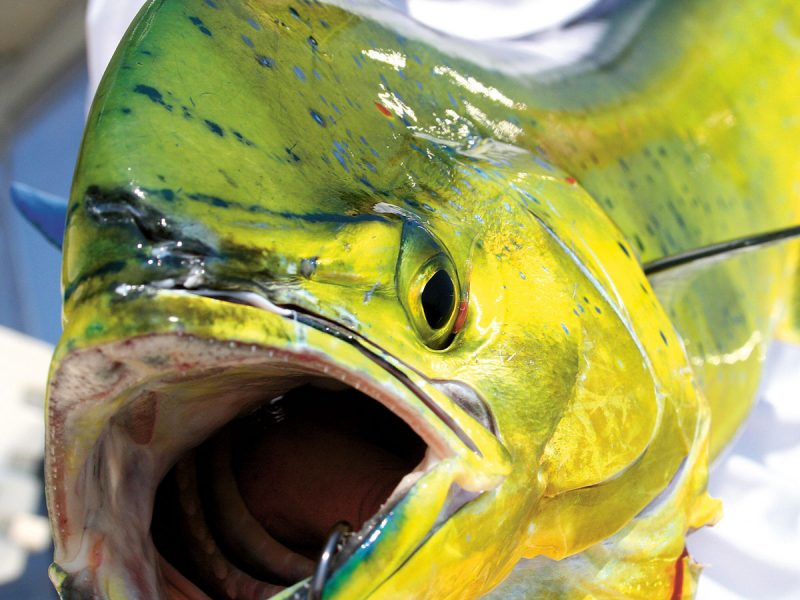
Sight-fishing for mahi is an incredible experience. Seeing an iridescent mahi lit up at boatside is a sight that never gets old. These fish are perhaps the most beautiful fish swimming in our local waters. When in the water, they look like psychedelic little submarines, and they have the ability, like a chameleon, to rapidly change color from silver to electric blue, and then green and then gold. Many offshore trips have been saved by these prolific fish, and some of my fondest blue-water memories involved sight-casting to them.
Catching mahi is not particularly difficult. Any form of floating structure attracts them like a magnet. Areas that have dense concentrations of high-flyers are a likely place to start your search, although permanent structure like weather buoys or floating debris are even better. High-flyers are typically hauled in and reset at least once a week, so if you hit a fresh set, they are less likely to have any tenants.
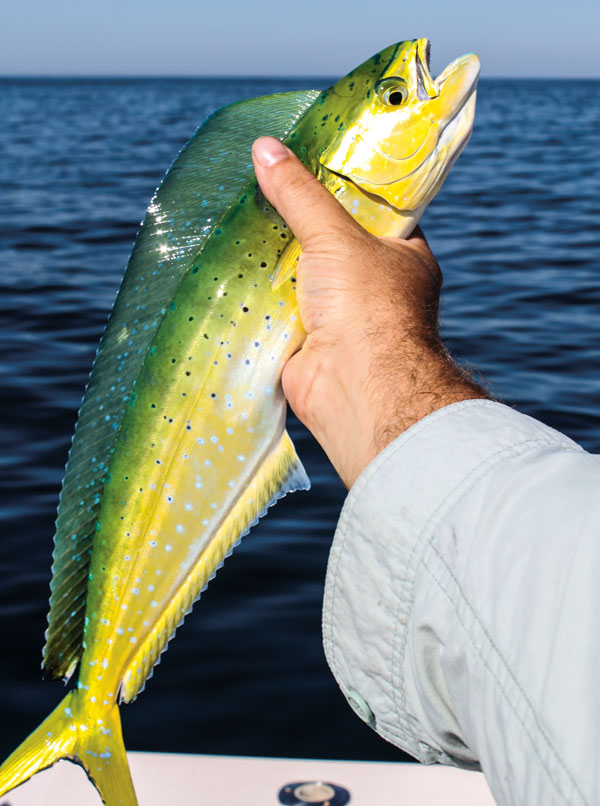
Mahi are aggressive feeders that will hit just about anything. While fishing artificial lures is a fun way to catch them, I’ve found the schools usually wise up after you pluck a few fish from the pack. My preferred method is the old chum-and-switch trick. Pull the boat just up-current from the high-flyer and toss out a few handfuls of cut squid or butterfish. If the flyer has any residents, they will quickly charge out and chow down. Throw out a few more handfuls of chum to get them all excited, then reset the drift, this time with baited circle hooks. Or, if you really want to have some fun, break out the fly rods. Mahi seem to have no fear of boats, so half the fun is watching them race each other, all lit up, to the bait. Once you hook up, sit back and enjoy the acrobatic aerial display mahi are known for.
As fun as they are to catch, perhaps my favorite thing about mahi is how good they taste. Fresh mahi is delicious, one of my all-time summer favorites. They have fairly soft, oily flesh and are best eaten while fresh. Their meat is mild and firm, with just a hint of sweetness. Mahi holds up well on the grill but is also well suited for sautéing, frying or baking.
One night last summer, I grilled up fillets from fresh mahi, bluefin tuna, and tilefish. I kept the preparation simple – a drizzle of olive oil, salt and pepper. I grilled them to perfection and then conducted a taste test. The mahi was the clear-cut winner.
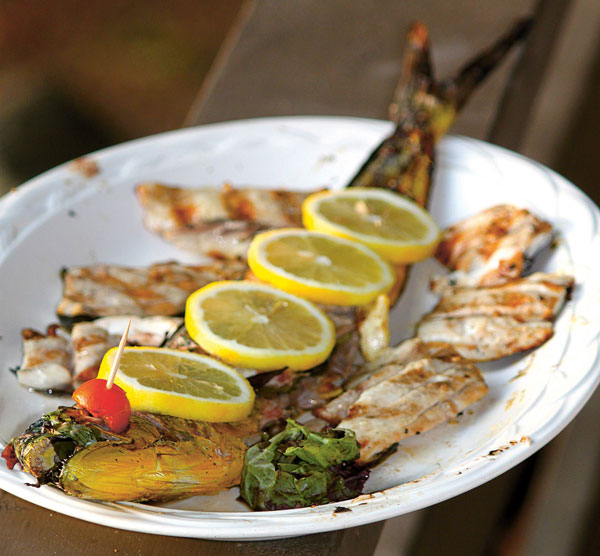
Here are the recipes I look forward to every summer and can’t wait to make again:
Pistachio-Crusted Mahi
- 4 6-ounce fillets, skinned, preferably cut from the thick loin section
- 1/2 cup unsalted shelled pistachios
- 1/3 cup panko breadcrumbs
- 2 tablespoons freshly grated Parmesan
- 1 teaspoon kosher salt
- 1/8 teaspoon ground black pepper
- 2 tablespoons olive oil
- 2 eggs, beaten
- Preheat the oven to 425 degrees. Lightly grease a baking sheet with cooking spray.
- Chop the pistachios into medium-fine pieces (a coffee grinder or food processor makes quick work of this). Combine the nuts, breadcrumbs, Parmesan, half the salt, and pepper in a shallow bowl. Drizzle with the olive oil and toss with a fork until the crumbs are evenly moistened.
- Dry the fillets with paper towels, and give them a light sprinkle of salt. Dip them in the beaten egg, then roll them in the crumb mixture. Place skin-side down on the baking sheet, and top with any remaining crumbs to form a thick coating.
- Bake the fillets until the topping is crisp and slightly browned, and the fish is cooked through, about 10 to 15 minutes, depending on the thickness. They will turn opaque and flake easily with a fork when done.
- Finish them for a minute or two under the broiler to get the top nice and crispy.
- If you want to keep things light, serve with a spicy mango salsa. If you’re feeling a bit more decadent, try it topped with a beurre blanc sauce.
Beurre Blanc Sauce:
- 1 shallot, finely chopped
- 1/2 cup white wine
- 1/4 cup lemon juice
- 2 tablespoons heavy cream
- 6 tablespoons unsalted butter, cubed
- Salt and white pepper, to taste
- Mix the shallots, lemon juice and white wine in a non-reactive saucepan.
- Cook over high heat and reduce by half, then add the cream and turn heat to low.
- Add the butter one cube at a time, whisking first while the pan is on the burner and then off the burner.
- Continue whisking in the butter until the mixture is fully emulsified and has reached a rich sauce consistency.
- Season with salt and white pepper.
Ginger Glazed Mahi
- 4 (6 ounce) mahi fillets
- 3 tablespoons honey
- 3 tablespoons soy sauce
- 3 tablespoons balsamic vinegar
- 2 teaspoons, fresh ginger, grated
- 2 cloves garlic, minced
- 2 teaspoons olive oil
- Salt and pepper to taste
- 1 tablespoon vegetable oil
- Fresh parsley, chopped
- Stir together the honey, soy sauce, balsamic vinegar, ginger, garlic and olive oil in a ceramic bowl.
- Dust the fillets with salt and pepper, place them into the bowl and mix them around in the marinade.
- Refrigerate for 30 minutes.
- Next, heat the vegetable oil in a large skillet on medium-high heat.
- Remove fish from the bowl, reserving the leftover marinade.
- Fry fish for 4 minutes, skin side up, then flip them, lowering heat to medium-low and continuing to cook until the fillets flake easily with a fork, about another 4 to 5 minutes.
- Remove to plate.
- Now, pour the remaining marinade into the pan and cook on medium-high heat until the mixture reduces to a glaze.
- Spoon this glorious concoction over the fish, garnish with parsley, and serve.
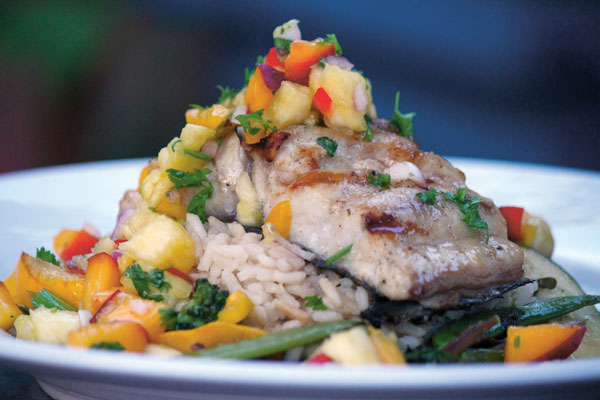
Honey Lime Grilled Mahi
- 4 six-ounce mahi fillets, skin on
- Salt & pepper
MARINADE:
- 1/4 cup fresh lime juice
- 2 tablespoons olive oil
- 1 tablespoon honey
- 1/4 teaspoon cayenne pepper
- Pinch of salt
Honey Lime Glaze:
- 2 tablespoons lime juice
- 2 tablespoons olive oil
- 1 tablespoon rice wine vinegar
- 1 tablespoon honey
- Place the fish in a bowl, mix with the marinade, and let it rest in the fridge for about an hour.
- Fire up your grill and get it nice and hot.
- Remove fish from marinade and dry off with paper towels.
- Sprinkle with a light touch of salt and a good dose of black pepper.
- Thoroughly clean your grill grates and oil them to prevent sticking. Add the fish, skin-side up, and sear for about three minutes, and then carefully flip them.
- Brush on the honey-lime glaze, reduce heat to medium, close the lid and cook for another five minutes.
- Top with any remaining glaze and serve on a bed of rice with mango corn salsa. So good!
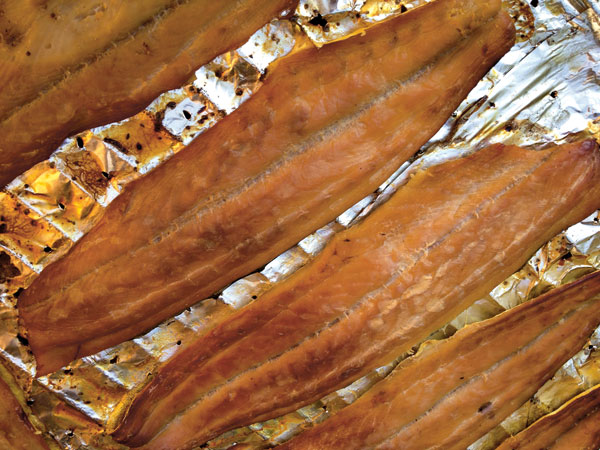
Smoked Mahi
Mahi is perhaps my favorite fish for the smoker. It has a fairly high-fat content, which bodes well for any smoked fish. I prefer smaller fish for this, or you can use the thin tail sections of fillets.
- 4 to 6 small mahi fillets
- Apple wood chunks for the smoker
BRINE:
- 2 quarts warm water
- 3/4 cup brown sugar
- 1/2 cup kosher salt
- 1 teaspoon ground black pepper
- 3 garlic cloves, crushed
- 2 tablespoons minced onion or shallot
- 2 bay leaves
- 1 8-ounce can pineapple juice
- Mix together the ingredients for the brine until the sugar and salt dissolve, and then let it rest until cooled.
- Place your mahi fillets in a non-reactive container (or a gallon zip-close bag) and refrigerate for at least 10 to 12 hours.
- Remove fillets, rinse under cold water, and dry them off with paper towels. Place them on a cutting board and refrigerate for at least an hour, which will further dry them off. When done, they should have a glazed look.
- Fire up your smoker and add in the applewood chunks. (Avoid using mesquite or hickory, as they can overpower smoked fish.) Don’t forget to add water to your smoker!
- Smoke the fish 3 to 5 hours until it develops a nice color. Yum!
Leave a Reply